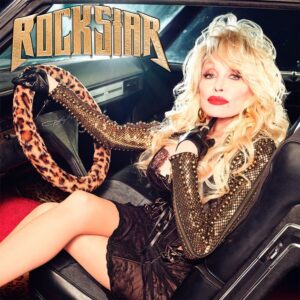Dolly Parton is already a rockstar? Or is she a pop star? Or a country icon? The 77-year-old, who has been performing since she was 10, has proved she can be all these things and more.

Released on Nov. 17, Parton’s album Rockstar comes a year and a half after she declined a nomination for a spot in the Rock & Roll Hall of Fame, saying, “I don’t feel that I have earned that right.” She was inducted anyway, of course, singing her 1973 hit “Jolene” at the ceremony last November with Pat Benatar, Annie Lennox, Dave Stewart, Simon Le Bon, Brandi Carlile, and Rob Halford.
After all that she got to work on the rock album she said at the time she had wanted to make someday.
Her 30-song, star-studded Rockstar is a party with all the coolest — and some of the oldest — rockers in attendance. Its celebrity appearances include the two surviving Beatles on “Let It Be,” and Parton and Emmylou Harris revisit the Trio album (1987), singing Linda Ronstadt’s version of “You’re No Good” with Sheryl Crow.
Twenty-one of the songs on the album are covers. Some, like Lynyrd Skynyrd’s “Free Bird,” have helped define the genre; others, like Miley Cyrus’s “Wrecking Ball,” seem more like pop. But the fact that genres bleed into one another on the album is part of the point. Parton is no purist — something everyone knew already back when she turned down that hall of fame nomination. She’s one of the most famous country musicians of all time precisely because she does more than country.
The album begins with the title track, in which Parton channels an angsty teenager in the titular song, locked up in her bedroom and tearing up the electric guitar to the chagrin of her suburban parents. It also recalls her true musical coming-of-age: her childhood in a small cabin in Tennessee listening to her mother hum Appalachian folk songs is part of the lore that established her status as a country singer.
When she first debuted as a musician, industry wonks insisted she perform bubblegum pop, but Dolly knew better because she knew her roots. Instead, at 19, she wrote and sang “Put It Off Until Tomorrow” with Bill Phillips and became a country star. Fourteen years later, in 1980, her classic workaday anthem “9 to 5” made her one of the few female country singers to have a number-one single on the country and pop charts at the same time.
Dolly-as-rockstar me be charming in part because we’ve forgotten the thrill of the old-fashioned rocker — the kind who stage-dives and slides on her knees while playing guitar and is out to rupture your eardrums. Her “rockstar” part sometimes comes across as a caricature, as when she wisecracks about encountering the ghost of Elvis Presley in “I Dreamed About Elvis,” complete with Ronnie McDowell as a lackluster king of rock and roll impersonator.
But the theatrics don’t make the album any less fun — in fact, they make it easier for a listener to strum along on an air guitar belting out tunes.
The original songs on the album, in particular “Rockstar” and “World on Fire,” showcase Parton’s world-famous twang and her pyrotechnic personality. The latter, a Joan Jett-like anthem about political greed, has caught some attention for its tone, given Parton’s career-long abstention from partisanship. Rock, it seems, enlivens Parton’s defiant streak, but just a little: the most assertive statement it makes is that politicians “wouldn’t know the truth if it bit ’em in the ass.”
Most of the covers don’t embellish the originals, and it’s hard to say why you would listen to Parton covering “Purple Rain” as opposed to Prince’s original. Many of these masterpieces are impossible to top — after all, they’re some of the most famous songs of all time. The production on many of Parton’s versions flattens the richness of the originals.
But maybe that’s intentional. To listen to Parton and these musical greats revel in songs they love is to hear them played with adoration, not as replicas of the irreplicable. Parton is at a stage in her career where having fun is reason enough to make an album.
There are some covers on the album to which Parton adds something new. “Stairway to Heaven” is among the most creative reimaginings of a song that’s both overdone and overplayed. Here, we breathe fresh air: Lizzo’s flute floats softly across the song, and Parton’s voice showcases the brusqueness it has gained with age. “(I Can’t Get No) Satisfaction,” with P!nk and Brandi Carlile, is a gender-swap commentary on sexual displeasure — plus, the singers’ voices pair surprisingly well together.
This is not the 1970s or 1980s Dolly, yet the glamorous, rhinestoned idol is just as much herself as ever. Rockstar is not about reinventing the wheel: it’s about savoring music, having fun, and rocking out.
